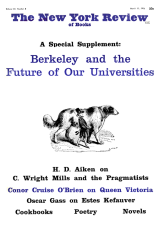In response to:
The Jews and the Death of Jesus from the January 28, 1965 issue
To the Editors:
I thought M. I. Finley treatment of the theme “Jesus and the Jews,” in your issue of 28 January, curiously haphazard and skimpy. If the theme is of any importance at all, or for that matter interest, why treat it so cavalierly?
Mr. Finley says he considers the whole background of the crucifixion beyond reconstruction; he also thinks “the world will have to be changed, not the past.”
As though the past could simply be obliterated! As though the world were not partly the past!
The burden of Christendom is the Crucifixion and its meaning. The satanic role the Jews must necessarily play in the cosmic drama devised by Christian mythology (glossed over by Mr. Finley in a remarkably shallow, rationalistic way in the phrase “notion of collective Jewish guilt,” which without explanation remains essentially casual and hence incomprehensible) is not a dead historic fact, but a living presence in the minds of hundreds of millions of people, all alive and kicking. It was, surely, a vital factor in the genesis of Auschwitz.
It is possible to reconstruct, with a reasonable degree of plausibility, the likelihoods behind the crucifixion. In a book called The Death of Jesus I had a crack at it myself. I think I showed two things:
One—which all liberal opinion now accepts—was the exclusive responsibility of the Romans for Jesus’s death.
The other was the real career of Jesus, which gave the Romans perfectly reasonable, and from their point of view wholly compelling grounds for executing him as they did.
The second is of course far more speculative; I think it can be made convincing by a re-analysis of the present sources.
If The New York Review is going to discuss this, why not discuss it?
Joel Carmichael
New York City
M. I Finley replies:
I trust that I have read Mr. Carmichael more accurately than he has read me. If his longish middle paragraph means what it says, then it must follow, on his view, that so long as Christianity and its “cosmic drama” remain a “living presence” and some Jews still survive, there will be continued persecution and perhaps more Auschwitzes. If so, no reconstruction of what actually happened to Jesus can be expected to have any practical effect, which is all that I meant by writing that “the world will have to be changed, not the past,” as should have been obvious from the context.
Furthermore, I cannot accept the suggestion that when I was asked to write a short analysis of Professor Zeitlin’s book with particular reference to the Vatican Council which was the occasion for its re-publication, I was required to survey the vast literature on the crucifixion. And I absolutely resist the implication that I had any obligation to consider Mr. Carmichael’s book because it happened to be one of the latest. I thought it more helpful to direct the reader’s attention to two recent scholarly studies in which he could profitably pursue further the limited subject under discussion.
This Issue
March 11, 1965



